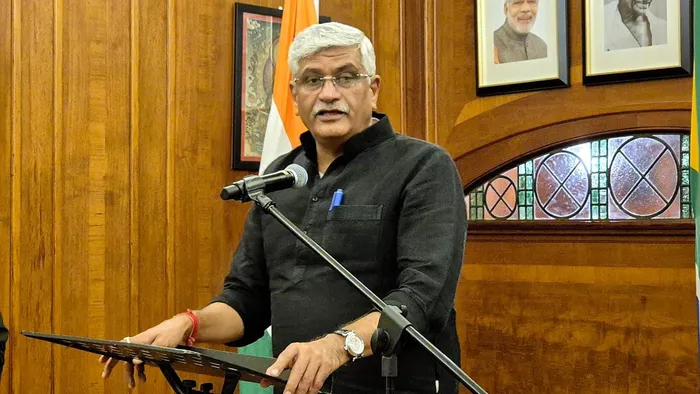Strengthening Bonds: Indian Minister Celebrates South Africa-India Relations

Indian Minister of Tourism and Culture, Shri Gajendra Singh Shekhawat
Image: Sibonelo Ngcobo
Indian Minister of Tourism and Culture, Shri Gajendra Singh Shekhawat, said he took pride in the deep connections that tie together the histories of South Africa and India.
Addressing a gathering of dignitaries and guests at an event held in Morningside, Shekhawat said, “Durban is not just a part of South Africa's soul, but is deeply woven into India's story too.”
Shekhawat highlighted that those relations between the two nations went beyond diplomatic formalities.
“These are bonds of history, courage, and shared struggle,” he asserted, recognising that although formal relations were established in 1993, the connections dated back centuries, rooted in trade, trust, and enduring friendships.
Regarding economic collaboration, he said, “Today, our partnership grows stronger through BRICS and the India-Brazil-South Africa Forum (IBSA), alongside a remarkable trade relationship valued at nearly $19 billion.”
Shekhawat pointed to KwaZulu-Natal as a pivotal symbol of this friendship, the home to the largest Indian-origin community outside India, a vibrant family of nearly one million individuals he referred to as Bharat's living bridge across the Indian Ocean.
“As Prime Minister Narendra Modi ji says, you are not just Pravasi Bharatiya (non-resident Indian); you are Rashtradoot (ambassadors) of Bharat's cultural spirit,” he said.
This year marked a significant milestone of the 165th anniversary of the first Indian indentured workers arriving South Africa on aboard the SS Truro.
During his address, Shekhawat touched on the historical importance of Durban, and spoke about how Mahatma Gandhi's transformative journey in the city.
"Here, a young lawyer named Mohandas found his true calling, and the world discovered its Mahatma.
"India gave Mohandas, and South Africa gave back a Mahatma," he said, and drew parallels to Nelson Mandela's inspiration from Gandhi's principles, as their legacies highlighted the pursuit for truth and non-violence transcend borders.
Under Modi's leadership, Shekhawat noted that India had emerged not only as an economic powerhouse but also as a pivotal voice for the Global South, exemplified by its initiative to include the African Union in the G20, which signalled a commitment to strengthening global partnerships.
The Minister further praised the continuity of cultural initiatives such as the Kashi Cultural Pathway, launched during India’s G20 Cultural Ministerial Meeting in Varanasi, and now championed in South Africa.
He reaffirmed India's dedication to global cultural engagement by supporting diaspora organisations such as the Phoenix Settlement and the Pietermaritzburg Gandhi Foundation, which aimed at preserve a shared heritage.
He invited the South African diaspora to engage in a knowledge renaissance through the flagship initiative, Gyan Bharatam, which digitises India's rich manuscript heritage for global access.
He also announced an upcoming movement called Ek Ped Maa Ke Naam (One Tree in the Name of Your Mother or the Mother Earth), encouraging people to plant trees in honour of their mothers and the earth.
"Each tree planted was seen as a symbol of love, remembrance, and sustainability. Let every tree stand as a testament to our shared values,” he urged.
“Though oceans separate us, our hearts beat as one. You are the soul of India abroad and a pride of South Africa at home.
"Together, let us nurture this sacred friendship, rooted in freedom, faith, and fraternity.”
DAILY NEWS